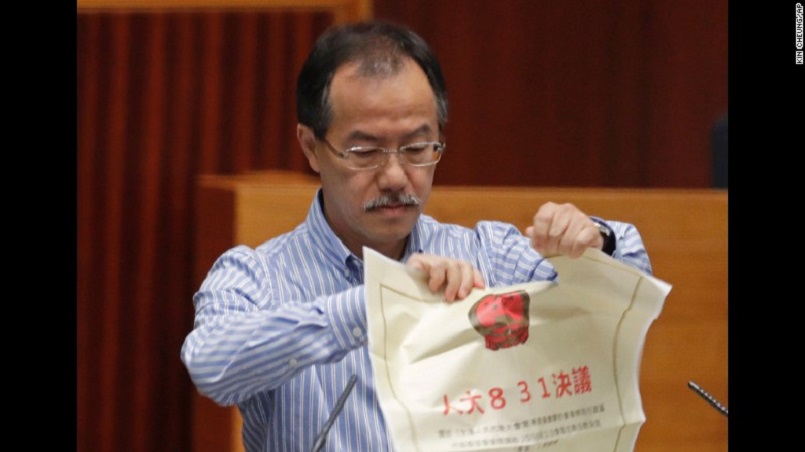
The first day of the new Hong Kong parliament descended into farce as several young lawmakers staged curse-laden protests at the swearing in of city's Legislative Council.
"I do solemnly swear that I will be faithful and bear true allegiance to the Hong Kong nation," pro-independence lawmaker Yau Wai-ching, 25, said after laying out a flag bearing the words "Hong Kong is not China."
Instructed to repeat the oath by Legislative Council secretary general Kenneth Chen, she described the city as the "Hong Kong special administrative region of the People's Re-f**k-ing of Chee-na (sic)."
Yau's oath was rejected by Chen, and she will have to retake it at a later date if she wants to take up her seat.
Also rejected was her Youngspiration party colleague Sixtus Leung, who displayed the same flag, and independent lawmaker Edward Yiu, who added a promise, to "fight for genuine universal suffrage", to his oath.
A spokesman for Youngspiration said the refusal to accept its lawmakers' oaths was "illegal" and dismissed claims they had deliberately mispronounced any of the words.
He added that the flag displayed was a "fashion statement," and that "saying 'Hong Kong is not China' is a logical statement, Hong Kong the city and China the country are different entities."
Gestures of defiance
Other lawmakers who were sworn in were no less combative. Umbrella Movement activist Lau Siu-lai read her entire speech at a snail's pace in an apparent protest.
Nathan Law, another former Umbrella leader and the city's youngest lawmaker, quoted Gandhi before making his oath.
"You can chain me, you can torture me, you can even destroy this body, but you will never imprison my mind," he said.
Law, the last lawmaker to be sworn in, then refused to leave the podium, demanding that Chen explain his reasons for refusing to accept the oaths of Leung, Yiu and Yau. He was joined by several other pro-democracy lawmakers as the session ended in chaos.
Worry for Beijing
Last month, Hong Kongers turned out in record numbers for the first major election since the 2014 pro-democracy protests.
Voters elected a raft of so-called localist politicians, those who favor greater autonomy or evenindependence for Hong Kong.
"People want to thumb their noses at Beijing and send a strong message that the past few years ... of suppressing Hong Kong's democratic aspirations cannot be tolerated," Chinese University of Hong Kong professor Willy Lam told CNN at the time.
China has reacted angrily to calls for Hong Kong independence, with some senior officials calling for "separatists" to be prosecuted.
